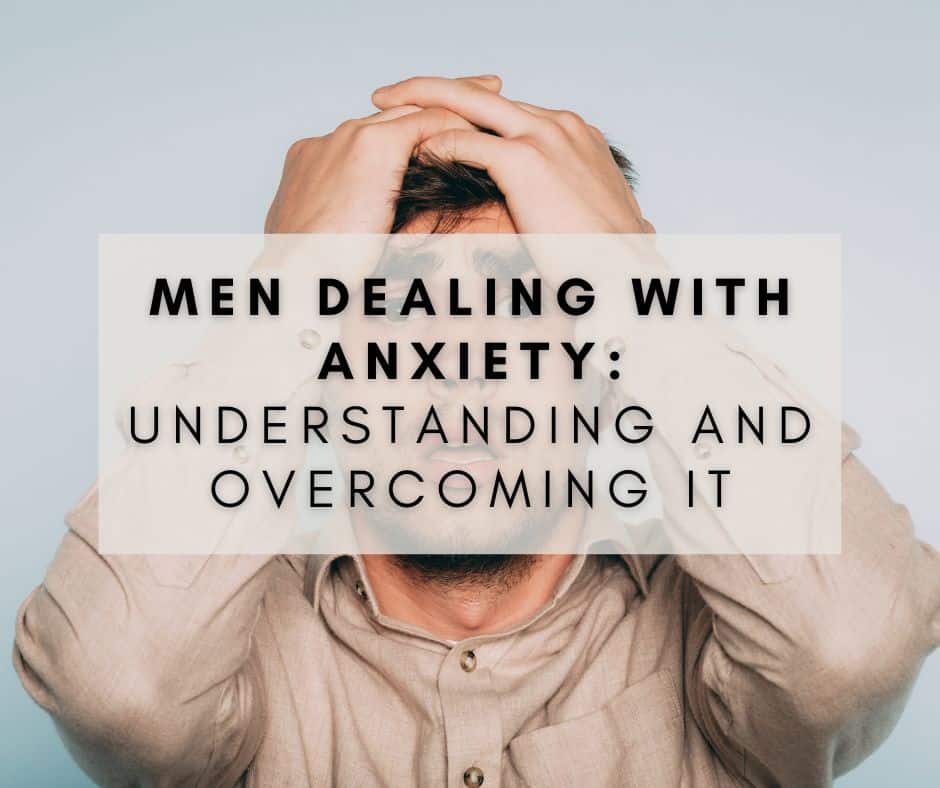Contents
- 1 Introduction
- 2 What is Anxiety?
- 3 The Unique Challenges for Men
- 4 Understanding the Causes of Anxiety in Men
- 5 Recognizing the Signs of Anxiety in Men
- 6 Overcoming Anxiety: Strategies and Techniques
- 7 Breaking the Stigma: Men Opening Up About Anxiety
- 8 Conclusion
Introduction
In today’s fast-paced and demanding world, it’s not uncommon for men to experience anxiety. While anxiety is a normal human emotion, it can become overwhelming and interfere with daily life when it develops into an anxiety disorder. In this blog post, we will delve into the topic of men dealing with anxiety, exploring its causes, unique challenges, and most importantly, strategies for understanding and overcoming it.
Did you know? According to the Anxiety and Depression Association of America (ADAA), approximately 1 in 8 men will experience an anxiety disorder at some point in their lives.
What is Anxiety?
Anxiety is a natural response to stressful or uncertain situations. It is the body’s way of preparing for a perceived threat. However, anxiety disorders go beyond temporary worry or nervousness and can significantly impact a person’s well-being. It’s important to differentiate between normal anxiety and anxiety disorders, as the latter may require professional intervention and management.
Key Symptoms of Anxiety Disorders:
- Persistent excessive worry or fear
- Feeling restless or on edge
- Difficulty concentrating or sleeping
- Physical symptoms like increased heart rate, trembling or sweating
The Unique Challenges for Men
Men face unique challenges when dealing with anxiety due to societal expectations, cultural norms, and traditional gender roles. The pressure to conform to the ideals of masculinity can make it more difficult for men to acknowledge and seek help for their anxiety. Toxic masculinity perpetuates the belief that men should be stoic, strong, and unaffected by emotional struggles. This can lead to a reluctance to open up about anxiety or seek professional support.
Key Challenges Faced by Men When Dealing with Anxiety:
- Stigma and societal expectations surrounding men’s mental health
- Pressure to appear strong and self-reliant
- Reluctance to seek help due to fear of being perceived as weak
Understanding the Causes of Anxiety in Men
Anxiety in men can stem from various factors, including biological, psychological, and social influences. While everyone’s experience is unique, understanding some of the common causes can provide insight into the origins of anxiety.
Key Causes of Anxiety in Men:
- Genetic predisposition and family history of anxiety disorders
- Traumatic experiences or past traumas
- Chronic stress from work, relationships, or financial pressures
- Hormonal imbalances or underlying health conditions
- Substance abuse or withdrawal from addictive substances
Recognizing the Signs of Anxiety in Men
Men may exhibit different signs and symptoms of anxiety compared to women, making it important to recognize and understand these indicators. While anxiety can manifest differently in individuals, being aware of the common signs can help men identify their struggles and seek appropriate support.
Signs of Anxiety in Men:
- Irritability or anger
- Increased risk-taking behaviors
- Physical symptoms such as headaches, digestive issues, or muscle tension
- Avoidance of social situations or changes in social behavior
- Difficulties with concentration or decision-making
Overcoming Anxiety: Strategies and Techniques
Managing anxiety requires adopting healthy coping mechanisms and developing strategies to navigate its challenges. Here are effective techniques that can help men overcome anxiety and regain control over their lives:
1. Seeking Professional Help
Professional help is a vital component in managing anxiety. Therapists, counselors, or psychologists can provide guidance, support, and evidence-based interventions tailored to your specific needs. Cognitive-behavioral therapy (CBT), for example, helps identify and modify unhelpful thinking patterns, while exposure therapy gradually exposes individuals to anxiety-provoking situations to build resilience.
Seeking professional help can be a transformative step, allowing you to gain a deeper understanding of your anxiety and develop effective strategies for managing it. Therapy provides a safe and supportive space for exploration, validation, and the acquisition of coping skills tailored to your specific needs.
2. Building a Support Network
Surrounding yourself with a supportive network of friends, family, or support groups can make a significant difference in managing anxiety. Sharing your experiences with trusted individuals who provide empathy, understanding, and encouragement can alleviate feelings of isolation and provide valuable perspectives. Support groups specifically tailored to anxiety can also offer a sense of community and shared experiences.
In addition to personal connections, online communities, and forums can provide a platform for discussing anxiety-related topics, seeking advice, and connecting with individuals who share similar experiences. Remember, you don’t have to face anxiety alone. Building a support network can provide a valuable source of comfort and encouragement.

3. Developing Healthy Coping Mechanisms
a. Exercise and Physical Activity
Engage in regular exercise and physical activity to release endorphins, reduce stress hormones, and promote overall well-being. Physical exercise has been shown to be an effective strategy for managing anxiety. It helps to alleviate tension, improve mood, and increase resilience to stress. Find an activity that you enjoy and make it a part of your routine. Whether it’s jogging, swimming, weightlifting, or practicing yoga, incorporating physical activity into your life can have significant mental health benefits.
b. Mindfulness and Meditation
Practice mindfulness and meditation to cultivate a calm and present state of mind, reducing anxiety symptoms. Mindfulness involves intentionally focusing your attention on the present moment without judgment. This can be done through various techniques such as breath awareness, body scans, or guided meditations. Regular practice of mindfulness and meditation can help to reduce the impact of anxious thoughts, promote relaxation, and increase self-awareness.
c. Creative Outlets
Engaging in creative activities can be a powerful way to express emotions, reduce stress, and find inner calm. Creative outlets such as painting, drawing, writing, playing a musical instrument, or even gardening can serve as effective means of self-expression and provide a sense of control and accomplishment. The process of creating something allows your mind to focus on the task at hand, diverting attention from anxious thoughts and promoting a state of flow and relaxation.
d. Deep Breathing Exercises
Incorporating deep breathing exercises into your daily routine can activate the body’s relaxation response and reduce tension. Deep breathing exercises involve taking slow, deep breaths, focusing on your breath, and allowing your body to relax. By consciously slowing down your breathing and engaging in deep, diaphragmatic breaths, you can regulate your heart rate, lower blood pressure, and counteract the physiological symptoms of anxiety.
e. Journaling and Self-Reflection
Utilize journaling and self-reflection as a means of processing emotions, identifying triggers, and gaining insights into patterns of thinking. Writing down your thoughts, feelings, and concerns in a journal can be a therapeutic practice that allows you to release pent-up emotions and gain clarity. Reflecting on your journal entries can help identify patterns, triggers, and unhelpful thought patterns. By gaining a deeper understanding of your anxiety, you can work towards developing more adaptive coping strategies.
f. Social Connections
Maintaining meaningful social connections is crucial for mental well-being. Reach out to trusted friends, family members, or support groups who can offer understanding, empathy, and support. Sharing your thoughts and feelings with others can provide a fresh perspective, alleviate feelings of isolation, and remind you that you’re not alone in your struggles. Engaging in activities with others, such as participating in team sports, joining hobby groups, or volunteering, can also foster a sense of belonging and promote positive social interactions.
4. Managing Stress Levels
Implementing stress management techniques can significantly reduce anxiety. Prioritizing self-care, establishing healthy boundaries, and practicing relaxation techniques such as deep breathing, progressive muscle relaxation, or guided imagery can help alleviate stress. Effective time management and prioritization can also alleviate stress and prevent overwhelm. Additionally, incorporating stress-reducing activities such as spending time in nature, practicing mindfulness, or engaging in hobbies can contribute to a more balanced and resilient state of mind.
5. Practicing Self-Care
Self-care is crucial for mental well-being. Engaging in activities that bring joy, relaxation, and fulfillment can help counteract the impact of anxiety. This can include hobbies, spending time in nature, practicing mindfulness or self-compassion, or engaging in activities that promote physical health such as adequate sleep, a balanced diet, and avoiding excessive caffeine or alcohol consumption. Prioritizing self-care allows you to recharge, nurture yourself, and create a solid foundation for managing anxiety.
6. Challenging Negative Thoughts
Cognitive restructuring involves challenging and reframing negative thoughts and beliefs. When experiencing anxiety, it’s common for negative thoughts to arise, amplifying feelings of fear and worry. Recognizing and challenging these thoughts can help you gain perspective and develop a more balanced and realistic outlook. By replacing self-defeating thoughts with more positive and constructive ones, you can cultivate a more adaptive mindset and reduce anxiety.
7. Incorporating Healthy Lifestyle Habits
A healthy lifestyle can support mental well-being and reduce anxiety. A balanced diet, regular exercise, sufficient sleep, and avoiding excessive substance use can positively impact your mood and resilience. Nourishing your body with nutritious foods, engaging in physical activity, and getting enough rest to contribute to overall well-being and can enhance your ability to cope with anxiety. By incorporating healthy habits into your daily life, you create a solid foundation for managing anxiety and maintaining optimal mental health.
Breaking the Stigma: Men Opening Up About Anxiety
Breaking the stigma surrounding men’s mental health is crucial. Sharing personal experiences and fostering open conversations can create a safe space for men to seek help without judgment. Influential figures, including athletes, celebrities, and public figures, have been increasingly vocal about their own struggles with anxiety, inspiring others to come forward and seek support.
Opening up about anxiety can have the following positive effects:
- Normalizing conversations around men’s mental health
- Encouraging others to seek help
- Breaking down barriers and reducing stigma
Conclusion
Anxiety is a common struggle faced by many men, but it doesn’t have to control your life. Understanding the causes, recognizing the signs, and implementing effective strategies can empower you to manage and overcome anxiety.
Remember, seeking professional help, building a support network, and developing healthy coping mechanisms are crucial steps toward reclaiming your mental well-being. By breaking the silence and sharing your experiences, you contribute to breaking the stigma surrounding men’s mental health, inspiring others to do the same. Embrace the journey towards understanding and overcoming anxiety, and step into a life of resilience, fulfillment, and emotional well-being.
Amazon and the Amazon logo are trademarks of Amazon.com, Inc, or its affiliates.






Leave a Reply